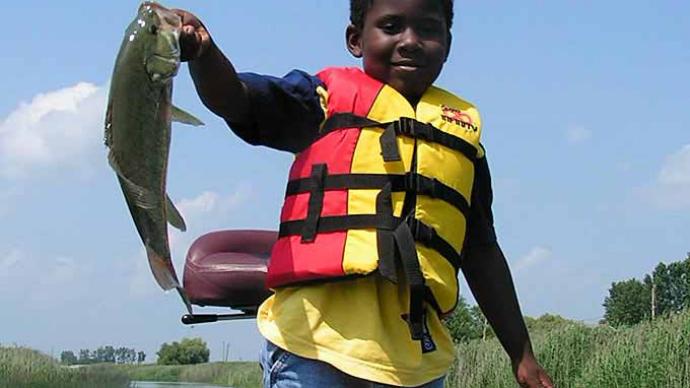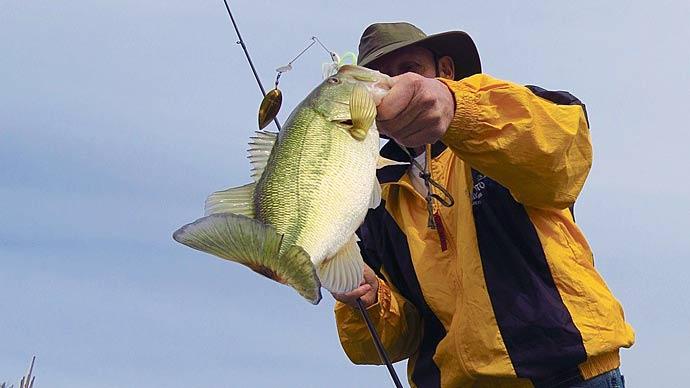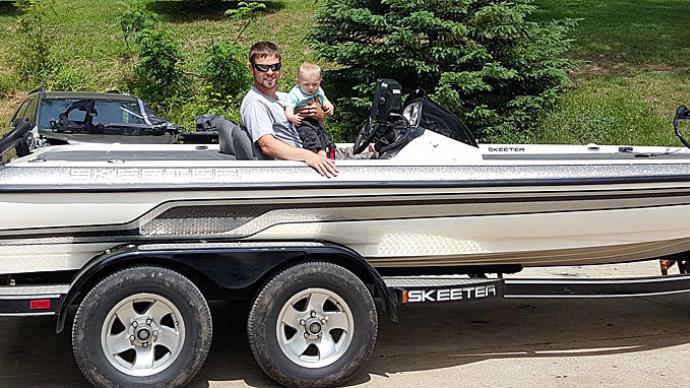
My family lived in the tiny town of San Luis, Colorado from 1959-1963. It is the oldest town in Colorado, and if you happened to forget that fact you could read it spelled out in white rocks on the side of the mountain, like it was Hollywood.
San Luis was and still is a farming community, and most of the families were descendents of the original Spaniards who settled there in 1851. Most were also Catholics. Only a small handful of folks were protestant, and we attended the only protestant church around, which was located in another town about 15 miles away.
Being a teacher, my dad took education seriously. Skipping school, well, I simply didn't do it. Of course, it might have had something to do with the fact that my dad taught at the same school I attended, and if I skipped, he'd be the first to know. So, rain or shine, snow or sandstorm, I slogged to school day in and day out. Only a substantial fever kept me home.
Our spiritual education followed the same basic rules of attendance as our public school education—you don't skip church or Sunday school. I admit to skipping Sunday school once by hiding out with my best friend in the church's broom closet—until the minister's wife caught us and marched us to our parents. Suffice it to say neither of us skipped Sunday school again. God never did let me get away with much.
Being the resident town musician, Daddy directed the choir at our church on Sundays and also played the organ for the Catholic Mass on Saturday nights. He usually took the summer off, but we still attended church every single week—except for the summer I turned six years old and my mom came down with typhoid fever.
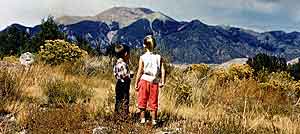
Mom spent a couple weeks in the hospital, but she wasn't the only one sick in our little family. My younger brothers, ages four years old and six months, both caught simultaneous cases of the measles and the mumps while she was gone. Daddy and I worked round the clock caring for the boys and keeping up with the housework. I will never forget the heart wrenching sound of the baby crying all night long with no mother's arms to comfort him.
When mom was released from the hospital, she was too weak to manage the household and three young children, and because the doctor recommended a long three-month convalescence, my grandparents took her and my two brothers to their home in Albuquerque, New Mexico for the summer.
During the summer months when the migrant farm workers came to work the fields, San Luis provided Migrant School for their children, so my dad needed to stay home and teach. I wanted to go to Grandma's house, but daddy told me, "I need you to stay here to keep the home fires burning." Wow, that was an offer I couldn't refuse—a summer long game of "house."
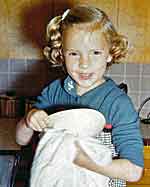
Needless to say, as the days and weeks rolled along, "house" became "chores," and finally turned into drudgery. But, the two of us managed pretty well. Daddy was a good cook, in fact he taught my mother how to cook when they were first married, so we didn't starve, and every week we made an attempt to clean the house. I hung the laundry on the line by standing on an old milk crate, and when the clothes were dry, daddy did the ironing.
We struggled in some ways, like having to get painful typhoid shots every week that made our arms so stiff and sore that the next morning they stayed stuck in whatever position we'd slept in the night before, usually sticking straight up over our heads. Our arms hurt so bad we had to help each other dress the first couple of days after the shots. Daddy's skills at rolling my hair had its downside. He twisted my hair around sponge rollers so tight it nearly pulled my eyes shut. The upside? I only had to endure it on Saturday nights because those curls lasted all week! Mainly though, we both missed Mama and the boys.
One Sunday, after they'd been gone a month or so, I woke up to find Daddy wearing his fishing clothes and loading bologna sandwiches into a picnic basket. Our rods and reels leaned against the kitchen table. "Let's skip church today, Schotzie," he said, "I want to go fishing."
Boy, I was thrilled! I wolfed down a bowl of Cream of Wheat, drank my milk, and we loaded up the car—a beat up green 1939 Mercury coupe, and headed up to our favorite spot on Culebra Creek.
I spread an old blanket on the ground while daddy turned over a few shovelfuls of earth, and then we picked through the soil collecting worms and storing them in an old tin can we kept in our creel for that purpose. The warm sun balanced out the crisp dry morning air, and Meadowlarks sang in the thick brush. Daddy and I chose our fishing spots on the bank of the creek, threaded worms onto our hooks, and made our first cast.
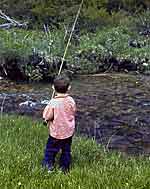
Wham! "I got a bite!" I whisper hollered to daddy. I'd learned from my grandfather that loud noises scare the fish away.
"Give him some line," daddy yelled, dropping his pole and grabbing the net. I guessed it didn't matter if you scared a fish on the hook.
I released the hold on the reel and let the fish run a ways, and then reeled it in a little, gave it some more slack, and then reeled some more. As the fish got closer to me, the tip of my pole bent down so far toward the stream I thought it might snap in half.
I'd caught many trout before, but never had one given me such a fight. By this time, Daddy was beside me with the net, ready to help me land the trout, but I didn't want help. Daddy coached me through until I had the writhing fish dangling out of the water and furiously flipping its tail.
"Holy smoke," Daddy said, "would you look at the size of that fish!" He stuck the net out over the water, and I lowered the fish into it. We made our way over to where dad had the creel. Daddy removed the hook for me, and then held the fish while I poked the stringer through the gills and out it's mouth.
Daddy kept a fold-up yardstick in the creel, and we measured my catch.
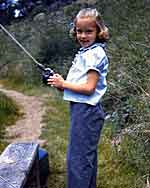
"You little turkey!" Daddy tousled my hair, "You just beat me. I've never caught a 14 incher before. 13 inches is my best. I guess you're the new champion fisherman in the family."
My reign was short lived. Just then, daddy's pole slid into the stream. He jumped in the creek, slipped and fell with a splash in water still icy cold from the winter melt, and somehow managed to grab hold of his rod. Soaking wet, he stood in the water and reeled in his own trophy trout—a 15-inch rainbow.
"Get the net!" he yelled, and I too was in the creek, helping land that fish. Freezing cold, we stretched out on the blanket, letting the sun warm and dry us.
"We've got us a problem, Bethie girl," daddy said.
"How could we have a problem?" I was fishing with my daddy and we'd just caught two gigantic trout.
"I kinda told the minister you were coming down with a cold...and because of that lie, we can't tell anybody we caught these fish." He chuckled, "See what happens when you tell a fib, Schotzie? God never lets you get away with it."
"Is God going to punish us?"
"I think he just did by letting us catch the biggest trout of our lives and not letting us tell a soul. I guess the only thing to do is scoot home and eat these fish fast."
And so we did.
Neither of us ever told a soul either—that is, until today.
Reprinted with permission from Pond Boss Magazine

